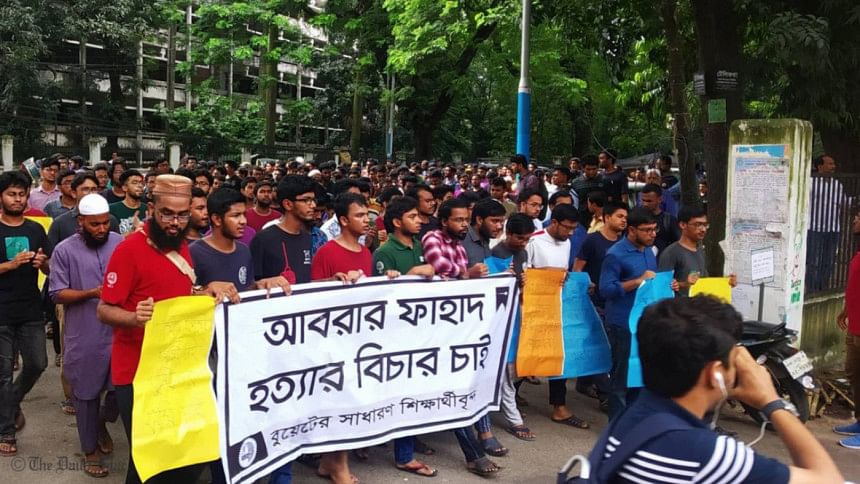Root cause of ailing student politics
Upon seeing the news of student politics being banned on campus in Bangladesh University of Engineering and Technology (Buet) recently, a few crucial factors to consider stand out regarding Abrar Fahad’s death and the surrounding fallout against student politics.
The problems you see around you with student politics and the Bangladesh Chhatra League (BCL) is not just a by-product of a lack of administrative accountability, terrible politics and power-hungry political parties-- it's very much an issue of socio-economic and governmental structure, as well as representation within those structures.

A significant number of the country’s student population do not find themselves agreeing with any kind of student politics. They consider the BCL largely a crime-prone outfit and would rather see it and organisations like them move out of campuses across Bangladesh. But there is a reason why the BCL will not go away even after the death of scores of students at their hands, and it has little to do with the symbiotic nature of political parties and their student wings.
As it stands, joining the BCL ranks is one of the sure-fire ways out of poverty, under-representation and abject unemployment. Outfits like the BCL thrive in public universities such as DU, JU, BUET and so on - other than perhaps Buet, a vast majority of the student population of these universities have little to no future ahead of them, and balancing the pressures of coming from lower economic backgrounds and making something of a university degree is enough to push these students to desperation. You'll see that desperation right in front of you if you ever visit departments of Dhaka University like Pali and Buddhist Studies, World Religions and Culture, Islamic Studies, Urdu, and other such subjects that offer hardly any employment opportunities, no scope of personal growth or zero sense of significance. There is a reason why the rank and file of the BCL are from these departments.
Add to that the pressures and competition for entry into government service through the Bangladesh Civil Service exam-- with a degree from one of these aforementioned departments, you have no choice but to gun for civil service any way you can.
Even further, add the fact that Dhaka is the 72nd most expensive city to live in, in the world, and the son or daughter of a rickshaw-puller from some far off char in the Bangladeshi countryside (who did get into DU or JU or Buet through their own academic merit), starts to consider the prospect of living off campus unthinkable.
At every stage, you have die-hard party supporters looking to scoop up these students and add them to the frontlines of BCL. They offer you a hall seat so you don't have to spend twenty times the amount to stay off campus. They offer you free meals at the cafeteria. They promise you motorbikes if you rise up the ranks. They tell you there's employment and economic emancipation at the end of the rainbow. They tell you that you can be a significant player of the country as a leader or a member of parliament in the future.
In exchange, you need to attend rallies, volunteer your services at events by handing out packets of food and beverages, and occasionally murder a few dissenters through torture and beatings.
To be clear, some of these students may carry with them an affinity for violence and are finally provided a platform to express their views-- but they are largely in the minority and are often shunned by the core leadership of the BCL, as evidenced by the frequent internal clashes over ego, a share of the spoils and promotions up the ladder.
It's not just BCL that does it. Those familiar with the culture and politics of public universities will attest to the same being done by Bangladesh Chhatra Dal, Chhatra Shibir and more during various periods in Bangladesh’s history. It has little to do with ideology but almost entirely to do with a struggle for power, economic access and political representation.
Since the return of democracy to Bangladesh, campuses have not been able to get out of this system. Not through hunger strikes, nationwide strikes, political lobbying, media coverage and opinion pieces much like this one-- nothing has come close to stamping out the menace that is student politics of this form. Nothing has solved the continued exploitation of misguided and misinformed students by vested groups-- on either side of the coin of extremism and liberal thought, which presents very different methods of solving the problems of the students being targeted.
And it won't be solved, in my view, until there is a significant shift in the structure of the job market and educational sectors—dis-incentivising government jobs for private sector jobs (or changing the way cadres are recruited), regulating the private sector to provide better benefits and job security to fresh graduates, and streamlining/updating the subjects on offer at public universities (or at least provide enough funding so these subjects can produce graduates of at least some quantifiable standard).
As long as students are fed through a funnel of SSC-HSC-university-BCL-BCS-government/politics without giving them options or alternative routes to representing themselves in government and politics, incidents like Abrar's will keep happening. Even if you reshuffle VCs and ban faculty politics and pare back student political activities on campus.

 For all latest news, follow The Daily Star's Google News channel.
For all latest news, follow The Daily Star's Google News channel. 








Comments